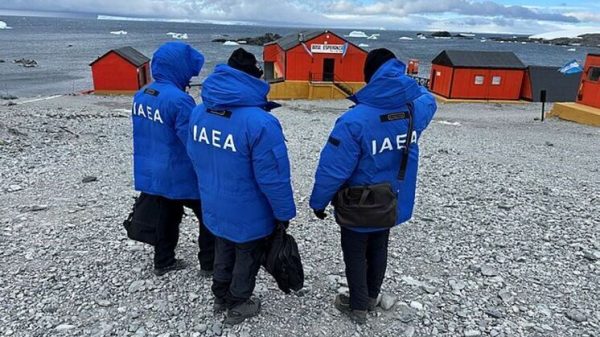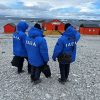 Soldiers break down a door during an anti-gang operation in Guayaquil, Ecuador Photo: John Moore/Getty Images
Soldiers break down a door during an anti-gang operation in Guayaquil, Ecuador Photo: John Moore/Getty Images
Angel's body lies on on the ground on concrete after soldiers dragged him out of his house and beat him in front of his family.
“Save me, mommy! They're killing me! he said before passing out on the steep streets of Vista del Mar, high in Esmeraldas, a port city in Ecuador.
As an excited crowd looked on, the officer pulled out a taser and electrocuted Angel, then doused his head with water.
He was forced into the back of a van along with four other young men. men, he was last seen alive.
Angel Alfredo Ortiz and his colleagues, including his brother and cousin, were “terrorists” in the eyes of the military, which waged a merciless fight against gang crime. and drug trafficking.
But the story of the young people on the front lines of the latest chapter of the new drug war sweeping Latin America may not be so black and white.
Vista del Mar is controlled by Los Tiguerones or Los Tigres, the «Tigers», one of the most powerful gangs in Ecuador. The streets bear the scars of decades of neglect. The life of the residents is marred by hardships. This area is marred by violence.
A group of young gangsters agreed to give me rare access to their lives on the condition that their names not be used and their faces covered during our interviews.
They tell the story of the young men as pawns. in a major war sandwiched between a new generation of hard-line presidents and powerful gangster bosses.
Before I met them, Angel's brother told me how soldiers had knocked down their door, broken their windows and captured their people in just a few hours. after Daniel Noboa, the president of Ecuador, declared war on gangs. Find out what happens when you find yourself in the middle of violence.
“You could see the anger in the soldiers’ eyes,” said Mauricio Renteria, Angel’s brother, who was also captured. “They were driven by the devil.”
Soldiers took the five men to a bridge on the outskirts of Esmeraldas.
Mr. Renteria, a 34-year-old hairdresser. who survived the ordeal with others said that the soldiers mocked them with death threats.
He had four broken ribs and said he was hit in the head with a stick, fracturing his skull, before he was ordered to climb onto the railing.
 Justina Cheme Gracia, mother of one of the missing young people believed to have been thrown from the bridge. Photo: Victor Raison for The Telegraph
Justina Cheme Gracia, mother of one of the missing young people believed to have been thrown from the bridge. Photo: Victor Raison for The Telegraph
It was difficult for him to remember the incident.
“There was so much blood, but I didn’t want to give the soldier the satisfaction of hitting me again, pushing me, killing me , so I closed my eyes and jumped.”
His hands were tied, but he thundered with all his might.
After that, he said, the soldiers threw the remaining men into the river one by one.
His brother, a weak swimmer, begged him to save his life.
“He kept shouting, 'Don't let me drown,' he said.
His cousin and the youngest of them were barely conscious after suffering beatings.
“They were silent in the water,” Mr. Renteria said. “I tried to save my brother, but in the end the current was too strong. «
The bodies of Mr. Renteria's younger brother and Javier Perlaza Garcia, 22, washed ashore several days later. Mr. Renteria's cousin, Edwin Eduardo Pataceli, remains missing.
Colonel Milton Rodriguez, head of the military's Joint Task Force in Esmeraldas, has denied allegations of brutality and extrajudicial killings.
“This is not the practice of the armed forces. All suspects we catch are taken to the police and processed,” he told local television.

The latest state of emergency was declared by the government in January after a wave of unprecedented violence swept across the country. Prisoners rioted and bandits went on a rampage, burning cars in the streets, shooting at police and civilians, and intruding on live television news coverage.
For several long hours, the Ecuadorian state lost control of its streets due to a criminal insurgency. Schools and businesses were locked down. Transport networks are suspended. Residents were locked in their homes in fear.
The crackdown reflects Salvadoran President Nayib Bukele's tough anti-gang strategy, but Mr Noboa denies he is plagiarizing his security manual.
< p>Since January 9, gang commanders have fled abroad or hidden in the country's dense tropical forests.
The brunt of war violence falls primarily on the rank-and-file lackeys, typically young men with modest salaries who joined the gangs to protect and support their families.
I met one of them. , «Juan», who is studying at the university. He trained to be a chef and is now studying business administration. The complex dance between his two contrasting worlds is complex.
“It’s like two personalities,” he said. «Sometimes it's hard to know who I am.»
In Esmeraldas, the insidious influence of gangs spreads like poison, drawing young people into the gravitational pull of organized crime.
Young people navigate a situation in which becoming a gangster is often inevitable for both survival and identity.
“You can become a gangster simply by being born in the territory of a rival gang. You are becoming a target for an enemy you have never even met,” said “Esteban.”
“Kill or be killed,” said 17-year-old “José.”
>“Ever since I was a child, I always wanted to study and be something in life,” he added. “But where there are no opportunities, where you earn more by doing bad things than by studying, this is what you need to do.”
Esmeraldas is the stronghold of Los Tigres.
Once they were able to roam the streets brandishing pistols, they hid their weapons and drugs and waited patiently for their orders to come from their overlords.
“Whatever happens, we are ready,” Jose said.
Like most Ecuadorian gangs, Los Tigres is controlled primarily by prison bosses, but since the crackdown began many of them have reportedly been moved to solitary confinement.
p>These young gangsters knew they were trapped in a cycle. violence, but gang ties run deep.
A key milestone for a Los Tigres gangster is getting a plaka, a form of registration plate, tattooed on his body.
“They'll brand you. They get a tattoo on the leg or other prominent place,” Jose said.
Usually the plaque is an image consisting of a combination of letters and numbers, often the initials of the gangsters and their date of birth.
The square is a symbol of power. It must be earned, usually by becoming “el mas loco,” “the craziest.” With this comes respect and often being led by gangsters.
Even the youngest can become the most ruthless.
Young Los Tigres gang member Photo: Victor Raison
Lack of legitimate economic opportunity allows gangs to flourish in Ecuador.
“You do it for your family, because in poverty you have to do what you have to do to survive,” said Jose, who joined the Los Tigres gang a year back.
“Los Tigres, we are not all like they say on TV, killers, or that we throw bombs like terrorists. No. Los Tigres is a family,” he told me.
Juan, 23, has been in Los Tigres for three years.
He rejected the president’s assertion that gangsters become terrorists in Ecuador.
“For us this is an insult. The President lived differently from us. He’s not on the street,” he said. “He doesn’t even know how to ride a bus. He should take the bus and see how people live here day in and day out.”
“When this month is over, you will see how many soldiers will die, how many people will suffer because the military did this, they cannot be left like this,” Huang said.
Life in a gang requires basic training and codes, explained the young men I spoke to.
“It's usually a six-month probationary period during which you are sent on different missions. They can send you to steal, sell drugs, transport a package, or kill you. This is a test,” Jose said.
 Photo: Victor Raison for The Telegraph
Photo: Victor Raison for The Telegraph
“They teach you how to shoot. Everyone should be able to ride a motorcycle. Everyone should know that if you eat grass, you will be killed,” Esteban said. «Everyone must know that he must defend his area, and if you meet the enemy, you must end his life at all costs.»
Young recruits also attend killing camps in which they are trained to violence and teach lethal methods.
“They take you to a place where you can shoot outdoors,” Esteban said. “This is for a few days. It's like they're teaching you how to play PlayStation.”
These young gangsters are at the forefront of organized crime. Many realize that they are foot soldiers in a battle that resonates far beyond them.
“I’m just another pawn,” Jose told me. “They send me to do something, and I have to do it.”
President Noboa's crackdown has done little to disrupt the supply chain.
While he wages war against gangs in his neighborhood, cocaine continues to flow through Ecuador. Since the beginning of the last state of emergency, 43 tons of drugs have been seized. According to Ecuadorian intelligence sources, cocaine laboratories continue to operate.
Corrupt officials in the corridors of power continue to line their pockets by colluding with gangs.
These young gangsters rarely make criminal profits from their involvement in international drug trafficking networks.
“We don't make much money. Everyone thinks we'll get thousands of dollars, but no. For example, to kill someone it costs $200-$400 (£160-£320), and to transport a large package it can cost over $600,” Jose said.
“This war is for the interests of the commanders. All this so that they have more power and money,” he added.
The gangster's worldview revolves around protecting the neighborhood, even if it means extorting its inhabitants. It's a twisted sense of duty that requires everyone to do their part for the gang.
“It's about protection. With so many enemies, it's about keeping our area safe,” said 23-year-old “Carlos.” “We should be able to afford guns.”
Gangs seek to establish dominance and, under constant threat of violence, can control the communities in which they operate.
“We are terrorists. You have to terrorize people into paying for extortion. The president is not wrong if he means it,” Esteban said.
Ecuador has become a key pipeline for cocaine to the United States and Europe, and with it one of the most dangerous countries in Latin America.
Gangs fight for control of turf and vie for lucrative partnerships with international drug traffickers from Mexico and Eastern Europe.
Local gangs such as Los Tigres are hired to provide route security smuggling and trafficking of cocaine from the borders of Colombia and Peru to the beaches and ports of the Ecuadorian coast.
When Noboa, Ecuador's youngest president, came to power, he promised to place gang leaders in new high-security detention facilities, but his tough-on-crime policies sparked a violent backlash from the gangs.
It all started with the escape of 44-year-old drug lord Jose Adolfo Macias «Fito» Villamar before he could be transferred. News of the escape sparked prison riots across the country, with violence spilling onto the streets, culminating in the invasion of a television studio in Guayaquil during a live news broadcast.
The President had to act. The government had to show force not only to suppress the gangs, but also to convince people that the state was still in control.
Tanks were deployed and the army restored order in neighborhoods and prisons.< /p>
“Taking back control of prisons is one thing, but military occupation is not sustainable,” said Daniel Ponton, a security analyst and academic in Quito, the capital.
“In addition, targeting gangs on the streets will have an impact limited effect unless you go after corruption and police, prosecutors and judges who are paid by drug traffickers.”< /p>
The military occupation of Ecuadorian prisons has also led to accusations of torture. The judges ordered a full investigation into the allegations made by the Guayaquil-based campaign group CDH.
Mr. Noboa responded by calling human rights activists “anti-patriots.”
“The president’s rhetoric is extremely troubling,” said Billy Navarrete, CDH director. “Security in the country should not be achieved at the expense of human rights.”
 Police are monitoring the arrested men who tried to seize the hospital in Guayase, Ecuador, January 21, 2024. Photo: STRINGER/AFP via Getty Images
Police are monitoring the arrested men who tried to seize the hospital in Guayase, Ecuador, January 21, 2024. Photo: STRINGER/AFP via Getty Images
Activists fear Mr Noboa could take another page from President Bukele's handbook and portray human rights abuses as a form of collateral damage, a price worth paying for increased security.
The Telegraph was unable to report to the Ministry of Defense Ecuador faces charges of human rights abuses and extrajudicial killings as interview requests were rejected.
The gang's life revolves around what they call «missions». These are specific tasks that more senior commanders set for themselves.
“Someone sells drugs, someone transports drugs, and someone kills. But there is always one that has the complete package. It’s me,” said Juan.
 12-year-old “sicario,” or hitman. Photo: Victor Raison for The Telegraph
12-year-old “sicario,” or hitman. Photo: Victor Raison for The Telegraph
The most difficult missions are known as suizas, or «Swiss». This is a play on the word «suicide» and a reference to Switzerland and its laws on assisted dying.
Los Tigres is an alliance of small factions consisting of «combos» of four to six people, usually male. Each quarter is controlled by a commander, who can have several combos at his disposal. The commander will rely on a small number of so-called «sekuas», or henchmen, who act as his assistants.
Local commanders are relatively autonomous and control the local drug trade, extortion, and hit squads and mercenaries. They control the transportation of drugs through the neighborhoods they control and surrounding areas. Their job is to expand and secure territory and fend off rival gangs.
«Big territory means more opportunities for drugs to move, which means more money,» Esteban said.
the youngest gang member I spoke to was «Oscar», who was recruited just a few months ago at the age of 12.
When I asked what he liked best about the gang, his answer was scary.
< p>“Murder,” he told me.
12-year-old killer caught in Ecuador'th Gang War | Dispatch Watch
Oscar's childhood innocence was eclipsed by the darkness of gang life as he followed in the footsteps of his father, uncles and brothers before him.
He had no childhood ambitions, his dreams were focused on a dark horizon.
“I want to be a gang leader,” he said.























































Свежие комментарии